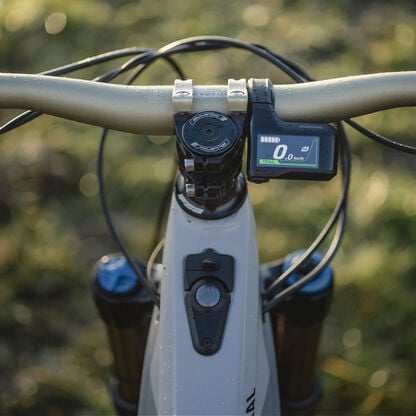Saddle up or slow down? Cycling with a cold
Wondering if you can still cycle when you're battling a cold? We've got you covered with some tips and cautionary signs to help you get back on your bike safely and quickly if you do happen to catch a cold.


If you're dealing with a cold or flu, you may have questions about how to maintain your cycling routine safely. You might wonder if it's okay to ride a bike with a cold, how to stick to your training plan, or what to do about an upcoming race or event. To help you navigate these concerns and avoid long-term risks to your health, we've compiled some tips and strategies for managing your physical activity during a cold or flu.

Cycling with a cold - how much exercise is allowed?
Whether light cycling is possible during a cold depends on the severity of your illness.
If you have mild cold symptoms, like a runny nose without an elevated body temperature, you can still go for a light bike ride outdoors as long as you feel up to it. Just be sure to drink plenty of fluids to help your body fight the cold and wear warm cycling clothing to avoid getting chilled.
However, it's best to avoid high-intensity workouts and heavy training sessions while you're still fighting the cold. If you have a competition coming up, it's better to cancel it and focus on getting better. And if you're experiencing severe symptoms like coughing, headaches, fever, or difficulty breathing, it's best to take a break from cycling altogether.
We advise you to always consult with your doctor if you're uncertain about whether it's safe to ride your bike while you're recovering from a cold.
Can you boost your immune system by exercising during a cold?
Exercising regularly in fresh air is beneficial for maintaining good physical fitness and strengthening the immune system. However, if you're currently dealing with a cold, it's important to be careful. Moderate cycling is okay if you feel well enough to do it without medication.
If you have a severe cold or flu, it's best to rest until your symptoms have completely disappeared. Too much or too early physical activity can put additional strain on your immune system, which can impede your recovery and pose long-term health risks.
When should I stop exercising with a cold?
If you experience symptoms such as fever, sore throat, body aches, or similar, it's best to avoid exercising. Having to take medication is a good indication that your body needs rest and you should not get on the bike.
Your pulse rate is another good indicator of whether your body is ready for exercise. An elevated resting heart rate can suggest that your immune system is fighting a cold. In this case, it's important to take it easy for a few days.
Tip: Indoor training is particularly useful in autumn and winter to monitor your performance values after a cold. The advantage of indoor training is that if you're still not feeling it, you can simply get off and immediately flop back on the couch. Check out our blog for tips on indoor training and our Zwift Guide.

Stay safe and healthy: Clear no-gos for cycling with a cold
If you have a cold, you should refrain from exercising if you experience the following symptoms:
- Fever is a sign that your body is fighting an infection and needs rest. If you have elevated body temperature, it's important to avoid cycling.
- When you're experiencing coughing or respiratory issues, cycling can exacerbate your symptoms. If your mucous membranes are significantly inflamed, it's best to avoid physical activity altogether and consult with a medical professional to determine the underlying cause.
- If you are feeling weakness and fatigue, it's best to avoid cycling as it can add additional strain. Consult with a doctor if you experience any circulatory problems.
- If you experience pain in the chest area or palpitations, you should immediately see a doctor. Don't take any risks with your heart!
Can you sweat out a cold by doing sports?
It's a common myth that you can sweat out a cold by doing sports. While exercise can help you feel better in the early stages or when recovering from a cold by increasing circulation and metabolism, intense physical activity can actually put additional strain on the immune system and worsen your health.
How long should I take a break from cycling when I'm sick?
As a rule of thumb, the stronger your cold, the longer the break should be before you resume training.
You should keep in mind these tips for cycling after taking a break due to a cold:
- When resuming training after a mild cold, your body should mostly be free of symptoms.
- After a flu with a fever (temperature above 38 degrees Celsius), it's recommended that you take a break of at least one week after your symptoms have gone away before starting to exercise again.
- Avoid high levels of exertion while still feeling weak after the illness. Start slowly and gradually increase the intensity. Monitor your heart rate!
- Always consult a doctor if you are unsure whether you can resume your training.
Can I ride an E-bike when I'm sick?
Even on an E-bike, you should listen to your body and take a break if you have severe cold symptoms. If your cold is getting better or if your symptoms are very mild, moderate exercise on an E-bike is okay if you feel fit enough. An E-bike is also perfect for a gentle return to training after an illness due to its motor support.

Is it harmful if I went cycling despite having a cold?
Your body is the best judge to determine if it is safe to engage in physical activity while being sick. It is always important to heed any warning signs that your body gives you. Extend your break from sports if your condition worsens again after the first ride.
Exercising while having a cold can pose health risks. Your immune system is already fighting an infection, but it is additionally burdened by physical activity. Pathogens can then spread more easily in the body. Moreover, you should not ignore the risk of myocarditis, an inflammation of the heart muscle.
What is the risk of developing myocarditis while cycling with a cold?
Myocarditis can be triggered by various factors, including viral infections or bacterial infections, as well as in cases of immune system disorders, parasitic or fungal infections.
It is unlikely that mild cycling with a cold will immediately cause myocarditis. However, myocarditis is a serious illness. Exercise can be very dangerous for people with pre-existing heart problems or myocarditis.
If your cold is accompanied by a viral or bacterial infection, you should rest and recover. Myocarditis often goes undetected. In the worst case, an inflamed heart muscle due to an infection that was worsened by exercise can be life-threatening. Increase the intensity of your training slowly and pay attention to your body's warning signals
The typical symptoms of myocarditis are:
- Shortness of breath
- Rapid heartbeat
- Chest pain
- Dizziness and fainting
- Swelling in the legs
If you experience these symptoms while cycling, you should immediately seek medical attention.
Did this article help?
Thank you for your feedback
-
 About the author
About the authorClaudia Krug
Meet Claudia, our SEO copywriter who switched from horseback riding to the excitement of exploring the wilderness and mountains of Europe on her bike. The passionate bikepacker, history buff and craft beer enthusiast dreams of one day riding The Great Divide. Join Claudia on her after-work rides around Leipzig, Germany, as she continues to explore the world on two wheels.










